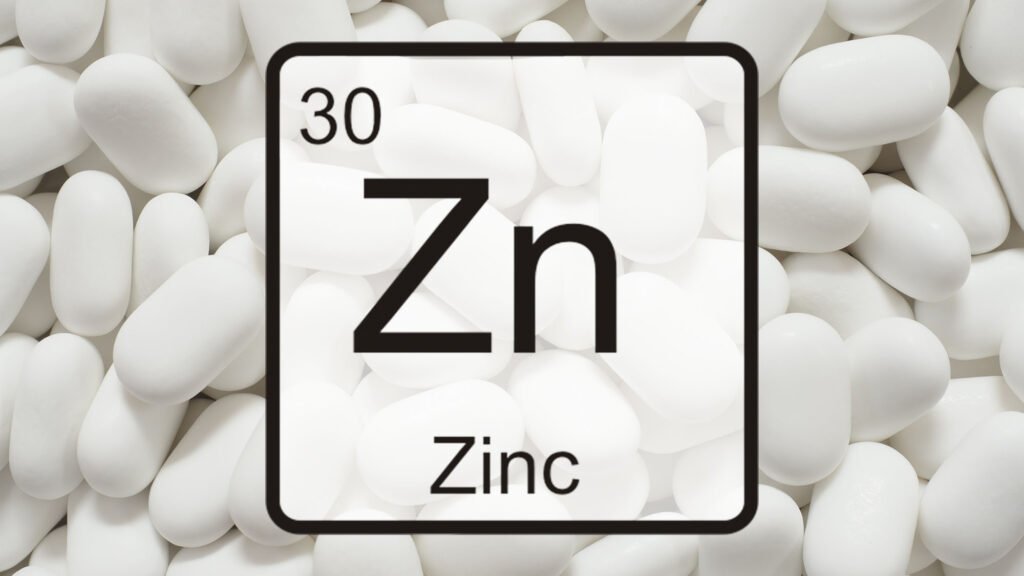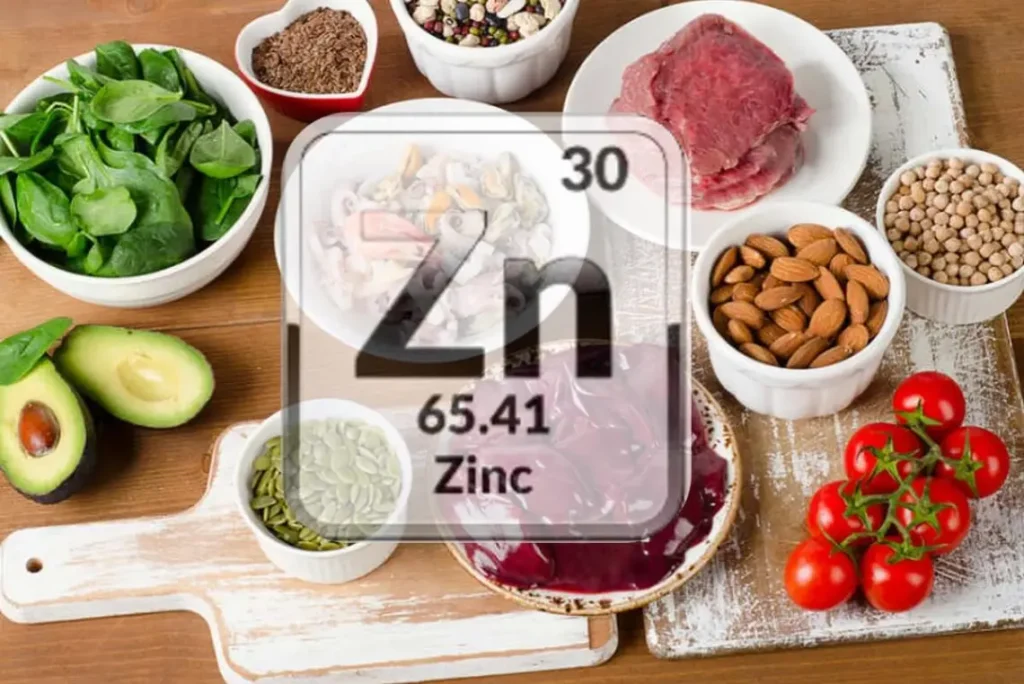Table of Contents
Did you know that zinc plays a crucial role in supporting a healthy immune system? That’s right! This essential mineral is a key player in keeping your defenses strong and protecting against infections. Let’s explore the fascinating world of zinc for the immune system and discover how it can help you stay healthy.
Brief The Article:
Why Zinc is Important for Immunity:
- Zinc is a vital trace mineral involved in numerous immune system processes, including DNA synthesis, enzyme function, protein synthesis, and thymus gland function.
- Zinc deficiency can weaken the immune system, making individuals more susceptible to infections.
Consequences of Zinc Deficiency on Immunity:
- Thymic atrophy: The thymus gland, crucial for T-cell production, shrinks, leading to weakened immune responses.
- Reduced lymphocyte count: Lymphocytes, key players in fighting infections, decrease in number.
- Impaired white blood cell function: White blood cells become less effective at fighting off pathogens.
- Slower recovery from infections: Healing from infections takes longer.
- Prolonged infection duration: Infections last longer.
- Increased inflammation: The body experiences heightened inflammatory responses.
- Increased oxidative stress: This can cause cellular damage and further weaken the immune system.
- Increased susceptibility to infections: The body becomes more vulnerable to viruses and bacteria.
Best Sources of Zinc:
- Dietary sources:
- Oysters and other shellfish
- Red meat
- Seafood
- Fish
- Pumpkin seeds
- Supplementation:
- Zinc bisglycinate chelate is a highly bioavailable form of zinc supplement with superior absorption compared to zinc sulfate and zinc oxide.
Factors that Inhibit Zinc Absorption:
- Phytates: Found in cereals, whole grains, and bran.
- Oxalates: Found in spinach, almonds, chocolate, kiwi, and rhubarb.
- Antacids: Reduce stomach acid, which is crucial for zinc absorption.
- Malabsorption: Due to gut damage, inflammation, antibiotic use, or gastric bypass surgery.
Key Takeaway:
Maintaining adequate zinc levels is crucial for a healthy immune system. Consuming zinc-rich foods and addressing factors that hinder absorption can help optimize your body’s ability to fight off infections.
So let’s dive into the details…
Zinc for the Immune System

The Multifaceted Benefits of Zinc
So let’s talk about the importance of Zinc for the Immune System. Zinc is probably one of the most important trace minerals because it does so many things, but one of the most important things it has the capacity to help is supporting your immune system.
Zinc functions
The Diverse Roles of Zinc in the Body

It’s involved in gene DNA synthesis making DNA. It’s involved in many different enzymes. It’s involved in protein synthesis, wound healing, heart health, joint health, insulin, thymus function, and your gonads. If you’re low in zinc, you’re not going to make enough testosterone.
Key Functions of Zinc:
- DNA synthesis
- Enzyme activity
- Protein synthesis
- Wound healing
- Heart and joint health
- Insulin regulation
- Thymus function
- Testosterone production
Zinc deficiency and your immune system
The Impact of Zinc Deficiency on Immune Function

So let’s take a look at what occurs if you become deficient in zinc related to your immune system. First thing is that your thymus gland starts to shrink. It’s called thymic atrophy.
Well, you need the thymus gland to make T-cells. It’s a training camp for white blood cells. Also, your lymphocytes go down. This is part of your army that fights infection.
Next one: defective white blood cell response, so your immune system doesn’t respond correctly anymore. Also, you get a decreased recovery rate of the infection,
so it takes you longer to heal. There’s an increased duration of the infection. There’s also increased inflammatory response.
There’s increased oxidative stress which creates a lot of collateral damage, and then you have a general decreased capacity to fight off infections, and you’re susceptible to viruses and bacteria. Other than that, you’re good to go.
Effects of Zinc Deficiency on the Immune System:
- Thymus gland shrinkage (thymic atrophy)
- Reduced lymphocyte count
- Defective white blood cell response
- Decreased infection recovery rate
- Increased infection duration
- Increased inflammatory response
- Increased oxidative stress
- Decreased capacity to fight infections
- Increased susceptibility to viruses and bacteria
Best sources of zinc
Optimal Dietary Sources of Zinc

Now the question is how do you get it? Well, there’s certain foods that are very high in zinc. Oysters are at the top of the list and also other shellfish. Red meat is a good source of zinc and other trace minerals. Seafood, fish, and pumpkin seeds.
If you wanted to get it as a supplement, I recommend getting the zinc bisglycinate chelate. Why? Because this is much more bioavailable than other sources. It has a 230 percent better absorption rate than zinc sulfate and a 390 percent better absorption rate then zinc oxide.
Best Zinc Sources:
- Oysters
- Shellfish
- Red meat
- Seafood
- Fish
- Pumpkin seeds
| Zinc Supplement Form | Absorption Rate Comparison |
|---|---|
| Zinc bis-glycinate chelate | Most bioavailable |
| Zinc sulfate | 230% less absorption than bis-glycinate |
| Zinc oxide | 390% less absorption than bis-glycinate |
What can prevent zinc absorption?
Factors Inhibiting Zinc Absorption

There are certain things in your foods that can prevent the absorption of zinc. One are phytates. Now where do you get phytates? That’s in all the cereals.
It’s in the whole grains. It’s in the bran. So if you’re consuming cereal on a regular basis or you’re doing breads and pasta and certain crackers, things like that, you potentially could be deficient in zinc.
Also, oxalates can deplete your zinc, and that would be in spinach, almonds, chocolate, Kiwi, rhubarb. Antacids and acids will also lower the absorption of zinc, and they really have to do with your stomach acid.

You need a lot of strong stomach acid to pull in the zinc. So antacids pull the stomach acid out, leaving you deficient in stomach acid, and now you can’t absorb zinc.
Also, malabsorption if you’re some type of pre-existing gut damage or inflammation in your gut because of whatever, maybe you took antibiotics when you’re younger, that could prevent the absorption of zinc. Also, gastric bypass could be another situation.
So if you have any of those conditions, you need to take more zinc, especially if your immune system is weakened and you’re more susceptible.
Factors Inhibiting Zinc Absorption:
- Phytates (found in cereals, whole grains, bran)
- Oxalates (found in spinach, almonds, chocolate, Kiwi, rhubarb)
- Antacids and low stomach acid
- Malabsorption due to gut damage or inflammation
- History of antibiotic use
- Gastric bypass surgery
Summary
Zinc is involved in:
• Genes and making DNA
• Many different enzymes
• Protein synthesis
• Wound healing
• Heart health
• Joint health
• Insulin
• Thymus function
• Gonads
What can happen in relation to your immune system if you have a zinc deficiency:
• Thymic atrophy
• Decreased lymphocytes
• Defective white blood cell response
• Low recovery rate
• Increased duration of infections
• Increased inflammation
• Increased oxidative stress
• Decreased capacity to fight off infections
• Increased susceptibility to viruses and infections
Foods high in zinc:
• Oysters
• Red meat
• Seafood/fish
• Pumpkin seeds
If you want to take zinc supplements, I think a good choice is zinc bis-glycinate chelate.
There are certain things that can prevent the absorption of zinc, such as:
• Phytates
• Oxalates
• Antacids
• Malabsorption (pre-existing gut damage or inflammation)
Additional-resources
FAQ
How does zinc help the immune system?
Zinc plays a crucial role in supporting the immune system in several ways:
- Enhances the development and function of immune cells, including neutrophils and natural killer cells
- Supports the production and maturation of T-lymphocytes
- Acts as an antioxidant, protecting cells from oxidative stress
- Helps maintain the integrity of skin and mucosal membranes, which act as barriers against pathogens
- Regulates inflammatory responses, helping to prevent excessive inflammation
By supporting these various aspects of immune function, zinc helps the body defend against infections and maintain overall health.
What are the two importance of zinc?
While zinc has many important functions, two key roles stand out:
- Immune System Support: Zinc is crucial for the development and function of immune cells, helping the body fight off infections and diseases.
- Cellular Metabolism: Zinc is essential for the activity of over 300 enzymes in the body, playing a vital role in DNA synthesis, protein production, and cell division.
These two functions highlight zinc’s importance in both defending the body and supporting its growth and repair processes.
What is the role of zinc in healing?
Zinc plays a significant role in the healing process:
- Promotes collagen synthesis, essential for wound healing and skin repair
- Supports cell proliferation and migration, crucial for tissue regeneration
- Enhances the immune response to prevent infection in wounds
- Acts as an antioxidant, reducing inflammation and oxidative stress in damaged tissues
- Aids in the formation of new blood vessels (angiogenesis), which is necessary for wound healing
Adequate zinc levels can accelerate wound healing and improve recovery from injuries and surgeries.
How does zinc benefit us?
Zinc offers numerous benefits to our health:
- Strengthens the immune system
- Promotes wound healing and skin health
- Supports normal growth and development
- Aids in protein synthesis and DNA formation
- Enhances taste and smell perception
- Supports reproductive health in both men and women
- May help reduce the duration and severity of common colds
- Plays a role in maintaining eye health, particularly in age-related macular degeneration
These diverse benefits underscore the importance of maintaining adequate zinc levels through diet or supplementation.
Best zinc for immune system
When choosing zinc for immune system support, consider the following:
- Zinc picolinate: Highly absorbable form
- Zinc citrate: Well-absorbed and gentle on the stomach
- Zinc gluconate: Common in over-the-counter supplements and lozenges
- Zinc acetate: Effective in reducing the duration of common colds
The best form may vary depending on individual needs and tolerance. It’s advisable to consult with a healthcare professional for personalized recommendations.
Zinc for immune system dosage
The recommended daily allowance (RDA) for zinc varies by age and gender:
- Adult men: 11 mg per day
- Adult women: 8 mg per day
- Pregnant women: 11 mg per day
- Lactating women: 12 mg per day
For immune support, some studies have used higher doses (up to 30-50 mg daily) for short periods. However, long-term use of high-dose zinc supplements should be monitored by a healthcare professional to avoid potential side effects or interactions.
Role of zinc in immunity ppt
A presentation on the role of zinc in immunity might include the following key points:
- Zinc’s impact on innate and adaptive immunity
- Its role in T-cell development and function
- Effects on cytokine production and inflammatory response
- Zinc’s antioxidant properties in immune function
- The consequences of zinc deficiency on immune health
- Zinc’s potential in managing infectious diseases
Such a presentation would highlight the multifaceted role of zinc in supporting and regulating the immune system.
Benefits of zinc sexually
Zinc plays a role in sexual health and function:
- Supports testosterone production in men
- May improve sperm quality and motility
- Supports prostate health
- May help with erectile function
- Plays a role in female reproductive health and fertility
While zinc is important for sexual health, it’s not a cure-all, and any sexual health concerns should be discussed with a healthcare provider.
Does zinc suppress immune system
No, zinc does not suppress the immune system. On the contrary, it supports and enhances immune function. However:
- Excessive zinc intake can interfere with copper absorption, which might indirectly affect immune function
- Very high doses of zinc (beyond recommended levels) might temporarily suppress certain immune responses
When taken as recommended, zinc supports rather than suppresses the immune system. It’s important to follow recommended dosages and consult with a healthcare provider before starting any supplement regimen.
Zinc Immunity Tablets
Zinc immunity tablets are supplements designed to support immune function. When choosing these tablets, consider:
- Form of zinc (e.g., zinc gluconate, zinc citrate)
- Dosage (typically 15-30 mg per tablet)
- Additional ingredients (some may include vitamin C or other immune-supporting nutrients)
- Quality and reputation of the manufacturer
While these tablets can be beneficial, particularly during cold and flu season, they should not replace a balanced diet and healthy lifestyle for maintaining strong immunity.
How much zinc to increase white blood cells
Zinc plays a role in white blood cell production and function, but there’s no specific dosage guaranteed to increase white blood cell count. However:
- The recommended daily allowance (RDA) is sufficient for most people to maintain healthy white blood cell levels
- In cases of deficiency, correcting zinc levels may help normalize white blood cell production
- Some studies have used doses of 15-30 mg daily for immune support
It’s important to note that abnormal white blood cell counts can be a sign of various health conditions. If you’re concerned about your white blood cell count, consult a healthcare provider for proper evaluation and treatment.
Is 50mg of zinc too much
While 50mg of zinc is above the recommended daily allowance, it may be prescribed in certain situations:
- The upper limit for zinc intake in adults is set at 40mg per day
- Short-term use of 50mg zinc may be recommended by healthcare providers for specific conditions
- Long-term use of high-dose zinc can lead to side effects or nutrient imbalances
Potential risks of long-term high-dose zinc intake include:
- Copper deficiency
- Impaired immune function
- Reduced HDL (good) cholesterol levels




